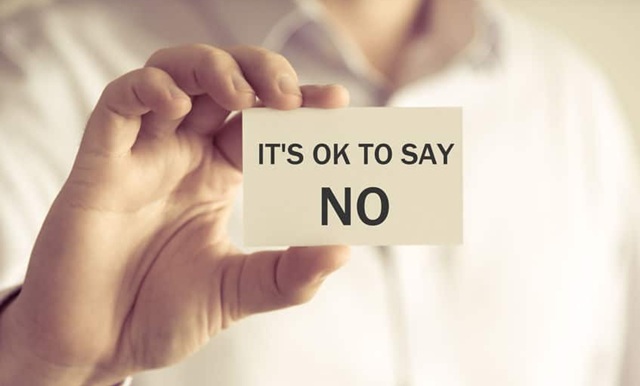Putting You First by Saying No
Hopefully, you noticed I mentioned saying NO quite a bit in the last chapter. It was no accident. Saying no to things that aren’t important to you or that you don’t enjoy is empowering. Everyone should do it!
So why is it so hard to say no, even when we are screaming it inside, when someone invites us to another boring event or to join in on a project? There are several common reasons for this:
- We’re scared we’ll look selfish
- We’re afraid people will be angry or hurt
- We don’t want to let someone down
- We are comfortable being over-scheduled
- We’re afraid of missing out on something
- It makes us feel important and valued
- We feel guilty about turning down the offer
- Our self-value is related to helping and pleasing others
Can’t promise it will be easy, especially since it’s likely that if you are reading this that you’ve spent a lifetime saying yes. But I do know it’s worth the effort! Here are a few things you can look forward to when you start saying no to things that aren’t important to you:
- More time for yourself
- More self-respect
- More energy
- Less stress
- Empowerment
- Fewer responsibilities
- More time to spend with loved ones
- More self-compassion
- More self-care
- The realization that life goes on without you being in control of everything
You’ll wonder why you didn’t do it sooner!
When to Say No
It’s important to understand that this exercise is not advocating saying no to every opportunity. You are encouraged to choose for yourself how you spend your time and energy. Instead of handing over those precious commodities to others, you’re going to take charge of them for yourself! It’s your life, and you deserve to live it the way you want!
Here are some suggestions for times when saying no might be in your best interest:
- When you are tired or overwhelmed
- When you are ill
- When you simply don’t want to
- When the offer sounds boring or is not in your wheelhouse
- When you have another way you’d rather spend that time
- When you’ve allocated that time to self-care
- It’s going to be stressful
- You’ll need to dedicate more time than is comfortable
- You already have a comfortable balance of obligations
- It’s not a part of your values (you don’t care about it)
- It will take time away from something important to you
- It’s not your responsibility
Tips for Saying No
If you need some tips for getting in the habit of saying no, here they are.
Schedule “You” Time
One of the best tips may seem unnecessary, but sadly, it isn’t. When was the last time you took time just to enjoy your own company? That can take any form. Maybe you want to sign up for a yoga class or take up meditation. Perhaps you want to learn a new hobby or take a class in some subject that’s always interested you. It doesn’t matter what it is. Schedule it into your calendar.
Yes, do block out time in your schedule for “you” time. After you get used to taking time for self-care, you may not need to do this, but for now, it’s important. If you don’t schedule it, it will go to the bottom of the list of priorities and never happen. Then, when someone asks you to do something that interferes with that time, you can simply explain that you have another commitment. There’s no need to explain that you are attending a pottery class or going to the putting range. Doing this will ensure you get quality time with yourself and will give you a real reason for saying no to things that aren’t important to you.
Don’t give in to guilt
You may have people in your life who are harder to say no to than others. That is normal. We all have that imposing manager, bossy friend, and overbearing relative. These people may put you on the spot when you tell them no. After all, they are used to you saying yes. If this happens, and it will eventually, don’t give in to the guilty reaction you might get internally or from them.
Some people play the guilt or victim card extremely well, and they are happy to bring it out whenever they need to persuade someone to do what they want. Stand firm and repeat your “no thank you”.
Prioritize Your Life
Just because you can squeeze in another commitment doesn’t mean you should! One of the reasons you are reading this is because you want to learn how to choose your life, choose how you spend your energy, and make yourself a priority. Having a hole in your schedule isn’t a good enough reason for saying yes if you don’t want to. When faced with this situation, ask yourself what’s more important to you—”having some downtime or making that person happy?”
No Justification Necessary
Just as we mentioned about not giving in to guilt, you may have some people who expect you to justify why you can’t do what they are asking. More likely, however, is that you’ll feel a compulsion to explain, even if you are making up an excuse. Remember, plain and simple “Sorry, but I can’t make it” is all that’s needed. After you say it, clamp your mouth shut. If you start telling them a story about why you said no, then they have that much longer to control your answer, and you’ll sometimes find yourself giving in.
Years ago, I had a brilliant young neighbor who summed this up pretty well when he gave an example of how he defined a friend,
“A true friend is someone who does NOT ask you why when you tell them you do not want to go to the movie with them.”
Hit the Pause Button
As we recommended in the Setting Personal Boundaries chapter, it’s good to get in the habit of not responding one way or the other immediately. Instead, tell the person you need to sleep on it or that you need to check your schedule, and you’ll get back to them. If the request is in an email, text, or voicemail, you can take the time to think about it before you respond. Doing this will give you time to decide if you want to commit and how to state your answer in the best way.
Make a Different Suggestion
If you are invited to spend time with someone you enjoy, but the event they propose is of no interest, or the timing will cause you to need to rush, consider making a different suggestion. If this week is busy, ask if you can postpone until the weekend. If the event isn’t something you care to spend your time doing, recommend a different one at another time. Doing this gives you practice saying no, but also allows you to spend time with people you truly enjoy.
Trust your Gut
Remember the discussion earlier about tuning into your body to learn your real emotions about something? When someone asks you to do something, this is another excellent time to use that technique. If it feels like a burden has suddenly landed on your shoulders, you should say no. If you need some time or space to gauge your gut instinct, tell them you’ll have to get back to them. You can trust that your body will “show” you what you feel deep down about accepting the offer.
Remember, learning to say no doesn’t mean you’ll say it to everything! Saying no is a choice. You get to choose how to spend your time and energy. That’s as it should be!
Please share your experiences in the comment section below.

<<<<<< Part One | Next Part >>>>>>










